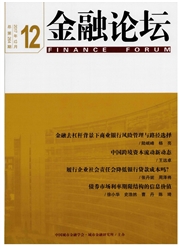

 中文摘要:
中文摘要:
本文运用门限向量自回归(TVAR)模型在宏观层面上对中国存款利率约束与宏观经济波动的非线性关联进行实证研究。研究发现:(1)中国在1996年1月至2013年11月期间的大部分时间都处于存款利率有约束状态,而存款利率约束在总体上减少了产出的波动;(2)存款利率有约束时,货币供应量等数量型冲击对产出影响幅度更小、持续时间更短,利率等价格型冲击对经济增长的作用周期更长,紧缩性的利率政策对经济的抑制效果更为明显;(3)存款利率无约束时,数量型冲击总体上持续性更强,价格型冲击则容易引起经济增长短期内大幅波动。
 英文摘要:
英文摘要:
This paper uses the Threshold Vector Autoregression (TVAR) model to verify the nonlinear relationship in macro level between the regulation of deposit interest rate and China's macroeconomic fluctuation. It is found that, (1) in China, there exists the regulation of deposit interest rate in most of the period during 1996.01-2013.11, and the regulation reduces the fluctuation of output overall; (2) when deposit interest rate is regulated, quantitative impacts, such as money supply, on output are smaller and last for a shorter time, but price-based impacts, such as interest rate, on economic growth last for a longer time and the inhibiting effects of tightening interest rate policy on economy are more obvious; (3) when deposit rates are not regulated, quantitative impacts last for a longer time overall, and price-based impacts are likely to cause great fluctuations in economic growth in the short term.
 同期刊论文项目
同期刊论文项目
 同项目期刊论文
同项目期刊论文
 期刊信息
期刊信息
